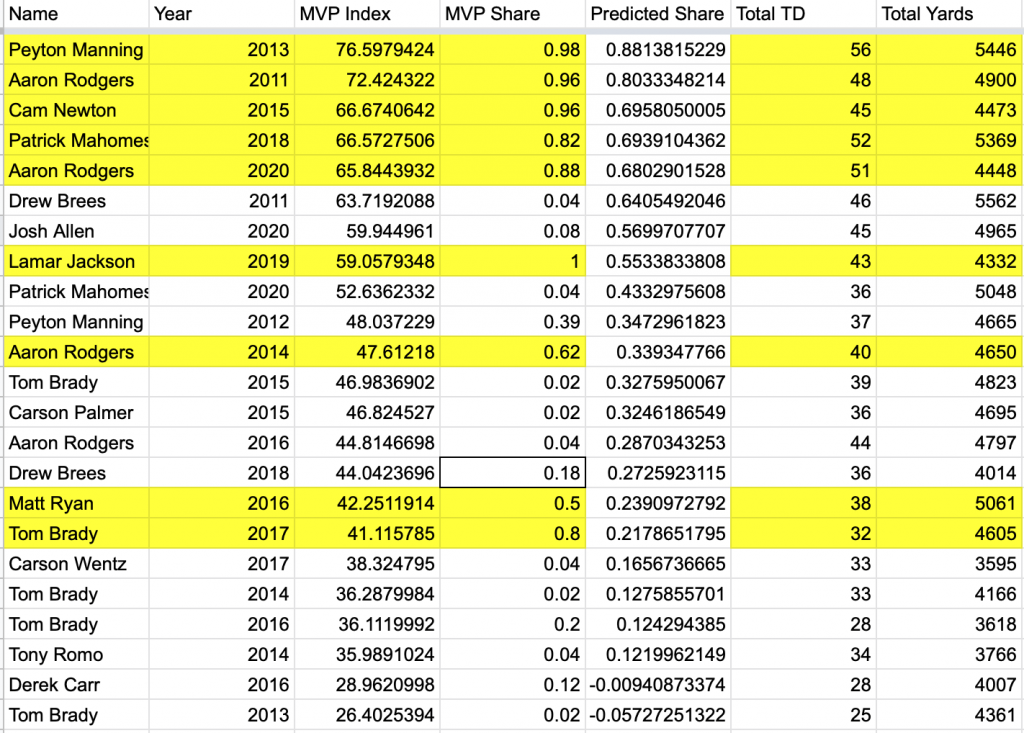On February 13th, the Rams and Bengals will battle it out for the Super Bowl title. This is certainly the sporting event all of us in the football stratosphere have been waiting for, but there is something to settle before then.
That would be the 2021 award voting. Will Ja’Marr Chase be the offensive rookie of the year? Will TJ Watt translate his sack record into his first defensive player of the year award? This is all to be settled on Thursday, February 10th, along with one another critical award: the 2021 NFL Most Valuable Player (MVP) award.
Honestly, what does MVP really mean? Really, it comes down to your definition of “most valuable”. Does that mean the player who performs the best? Or can we accurately decide which player meant the most to his respective team? There is a lot of subjectiveness that plays into it, but I’d like to take a look from a more objective basis.
Today, we’ll be utilizing historical MVP voting data through 2011. After finding out which metrics matter the most when it comes to getting an MVP vote, we’ll take a look at which player passes the bill as this year’s deserving 2021 MVP winner. There are a lot of ways to vote, but using how voters have decided in the past allows us to start to have an accurate blueprint of what an MVP winner should do in order to get the award. So, who should be the 2021 MVP? Let us take a closer look!
What Metrics Matter Most In The MVP Voting?
Since the MVP award has essentially been a quarterback award, we are going to focus exclusively on that position In my opinion, there are much stronger metrics to evaluate quarterbacks than year’s past. Statistics such as PFF grade and completion rate over expectation give us a strong idea of how well a quarterback played independent of his supporting cast, while expected points added (EPA) per play illustrates how effective a team’s passing attack was. That being said, voters still rely on older metrics, and that’s okay- as long as it’s unbiased with a clear amount of objectiveness in the process, it can be defended. With that in mind, there are three metrics that stand out above the rest:
Metric #1: Total Touchdowns
In a landslide, total touchdowns are the statistic that is rewarded the most, just like in fantasy football. Why is this the case? Well, I can think of a few reasons. For starters, scoring touchdowns is obviously correlated with leading an efficient, high-scoring offense. Meanwhile, the main way you can contribute to your team is by scoring points, so it makes sense the voters see this as a way of identifying value. Now, as we know, not all touchdowns are created equal; a quarterback sneak from the one-yard line isn’t the same as a 70-yard touchdown. Plus, does who scores the touchdown really accurately define the most important player on the drive- really, it’s just opportunity driven. Regardless, this is what the voters have latched onto.
Metric #2: Wins
Trust me; this frustrates me to no end. Wins should not be considered a quarterback stat, and for obvious reasons. It takes a complete team effort at all phases of the game to get a win, and a quarterback should not be penalized for poor roster construction or poor luck. Let me put it this way; was Jimmy Garoppolo a better quarterback than Justin Herbert because the former won more games than the latter? On the bright side, we know that the quarterback position, based on Wins Above Replacement and just anecdotally, is by far the most important position in football, so they do contribute to wins and losses a lot. Since 2011, no quarterback with fewer than 10 wins has finished in the top-three of MVP voting, with the average being 12.78 wins in a 16-game season. Remember, that’s just to be considered for MVP! If you’re looking for the MVP winner, they probably are going to need to be at the top of the league standings.
Metric #3: Total Yards
Total yards do factor in the MVP voting equation, albeit significantly less than total touchdowns. I can see why – total yardage is less indicative of an offense’s overall success than points scored obviously – though one can wonder if the gap should be as extreme as it is. Yes, yards can be accumulated in garbage time and other less-important scenarios, but so can touchdowns! Also, if a quarterback gets the team down the field, but the running back scores the touchdown, who was more important on that drive? Moving forward, if we continue to utilize surface-level metrics, I’d like to see total yardage take a greater weight in the voting.
Also, every game counts! Though players sometimes can miss games due to rest, season-long statistics correlated better with votes than per-game statistics. This is something that needs to be addressed on a case-by-case basis, but for our research, we are going to rely on accumulation statistics.
Creating The MVP Index
Just like that, we have everything we need to create the MVP Index! Using these three metrics, we can create a score to determine who should be the MVP, based on traditional voting criteria. This might seem overly simplistic, but, hey, simple can be good. As I mentioned previously, it would be nice to see more consideration for some of the advanced metrics we now have access to. However, until that is the case, we need to project the voting results with what we know correlates with it.
The score will be on a 1-100 scale, based on their percentile ranking among top-three MVP candidates since 2011. Here are the average statistics for each of the quarterback MVP winners:






Great insights on the MVP race! It’s fascinating to see how different players have stepped up this season. I think the case for [Player Name] is pretty strong given their impact on their team’s success. Looking forward to seeing how the rest of the season unfolds!
Great analysis! I completely agree that the MVP race is wide open this year. It’s exciting to see how different players step up each week. I think the edge might actually go to the QB who leads their team to the playoffs. Looking forward to seeing how the rest of the season plays out!
Great breakdown of the candidates! I think it’s going to be a tough call this year, but I believe that if Aaron Rodgers keeps up his performance, he deserves another MVP. However, Mahomes is always a threat. Excited to see how this plays out!